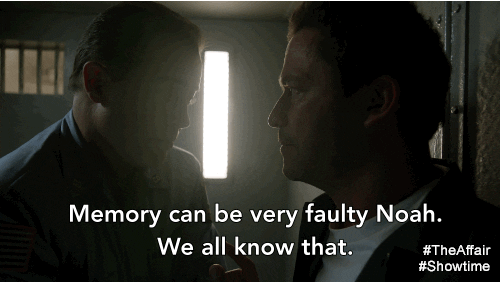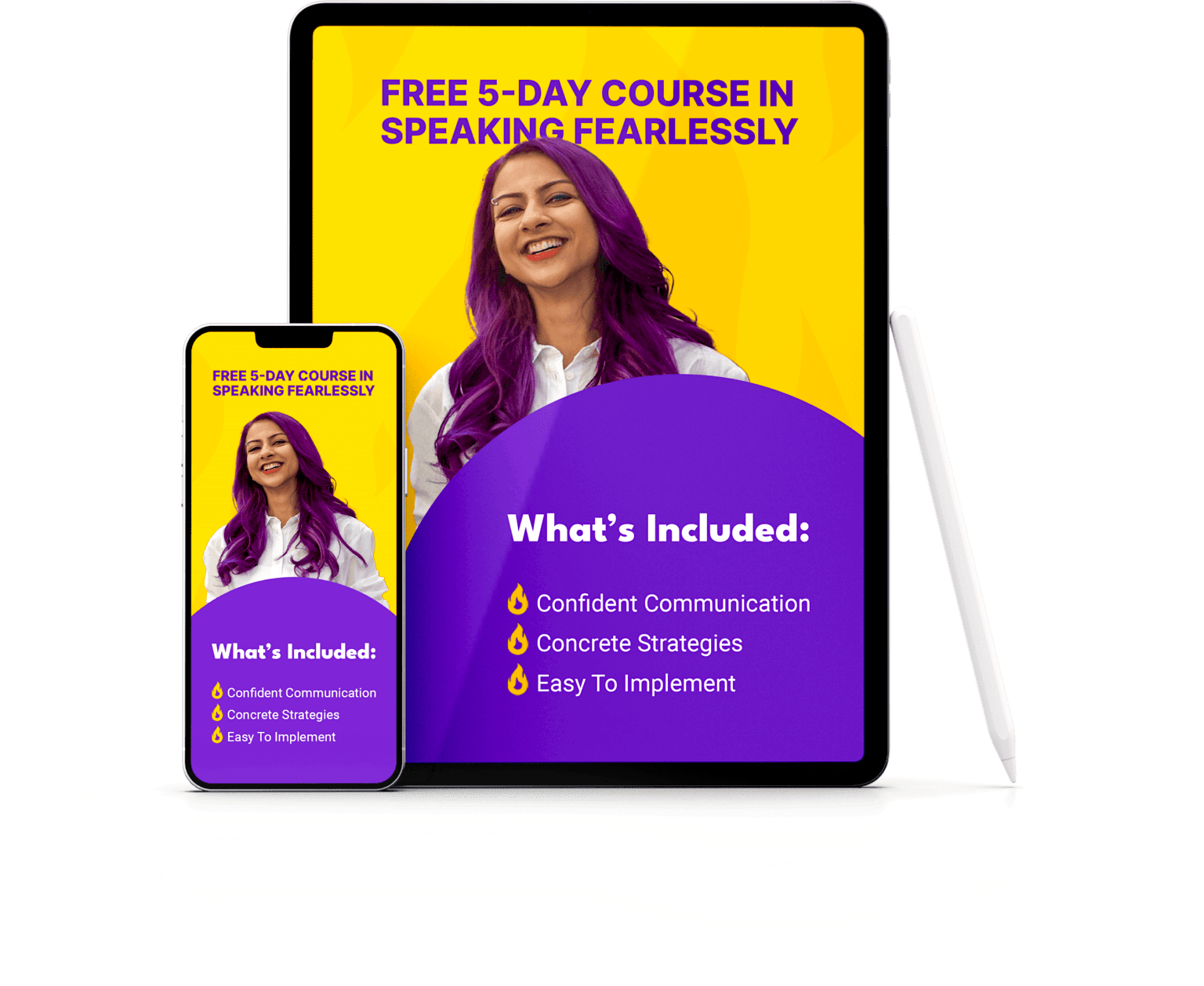“Nausheen, it was the worst day of my life,” said Maria, still shocked and traumatized from her last time on stage. “I’m not sure if I’ll ever be able to address a big audience.”
She had been recently promoted to Senior Director at a multinational bank. A self-confessed introvert, Maria was very talented, extremely hard working and great at her job. But she wasn’t comfortable being in the spotlight. So far she had only needed to talk to her own team. But now, for the first time, she had been asked to present in front of the entire company of over a thousand employees.
She got on stage, froze, blanked out and then ran off the stage.
That made her resolutely avoid any opportunities to speak in public for several months – till she found me. Throughout our coaching work together, she kept recalling the horror and panic she felt in the moment when she was in the spotlight.

Credit: Photo by storyset on Freepik
That experience of fear was quite real for her. During our coaching work, we began reframing her internal dialogue so that she could start moving beyond her trauma. Then we identified her strengths and opportunity areas as a speaker and had her practice her speaking skills on low-stakes platforms. Six months after her first harrowing public speaking experience, Maria marched onto the stage at the company’s annual event, and boldly made her presentation to a supportive crowd.
If you’ve had a bad public speaking experience – in person or online – I’m glad you’re here. In this article, I’m going to share the exact 7-step coaching process I took Maria through to help her overcome her public speaking trauma and thrive in the spotlight.
What’s inside:
1. How trauma and memory work
The first step on the road to recovery from a terrible public speaking experience (and moving onwards to public speaking mastery) is to understand how our brain processes and remembers trauma.
Research shows that the human brain remembers negative experiences more often than positive ones.
This happens because our brains prioritize survival. From an evolutionary perspective, noticing the lurking lion in the bushes was far more critical for survival than appreciating a beautiful flower across the path.
What does this mean for you if you’ve had a bad experience speaking to an audience? It could serve as a reminder that you’re probably remembering the speaking experience that went badly more than the other speaking opportunities that you’ve had that haven’t ended in disaster. You may have spoken and presented at many other occasions where you performed well. The trauma of the bad experience shouldn’t overshadow the success of other experiences.

There’s more good news: research says that finding positive meaning in memories of negative events updates our memory permanently. In other words, when you analyze a negative experience to look for positive aspects of it, you can change how you perceive those negative memories substantially. You can move towards reframing or lessening the impact of your traumatic experience of speaking in public if you can find some things that you did well during the same opportunity.
2. Detaching yourself from public speaking trauma

Credit: Photo by vecstock
One way of overcoming the trauma of your bad public speaking experience is to detach yourself from it. The key is to look at that experience from an outsider’s perspective.
Think of this exercise as playing the role of an actor and a director, one by one.
When you were speaking in the moment, you were the actor performing in front of an audience. But when you’re analyzing your performance, you’re not the actor anymore. Detach yourself from the person you see on the screen (or in your mind). Now you’re the director, watching the performance of your actor. You want to give your actor the best tips to perform better next time. You don’t take the actor’s flaws to heart – they are not your flaws.
This exercise allows you to detach yourself from the performance by keeping emotions out of it. Once you can detach yourself, you’ll be able to stop blaming yourself and look towards the future – towards improving your speaking skills. You can then go further and use mindfulness for your next presentation to stay present.
3. Becoming aware of your strengths and opportunities
After working with hundreds of clients, I’ve realized that people are much more aware of their shortcomings than their strengths. I want you to do the opposite: intentionally focus on your strengths.
Take a video of yourself speaking and analyze it – it can be a video of the same event that went poorly in your memory or another video where you’re speaking or presenting. This could be cringe-worthy at first but doing this exercise lets you take back control of your traumatic speaking experience.
Look out for things that you did well:
- Did you make great eye contact?
- Did you engage your audience with gestures?
- Did you speak clearly or start with a friendly smile?
Look for any aspect of your talk that you delivered well. It’s crucial to recognize your strengths so that you can build on them in addition to focusing on your opportunity areas.

Credit: Photo by Freepik
4. Targeting your mental blocks and limiting beliefs
With the analysis done, it’s now time to reflect. Identify any mental blocks or limiting beliefs that you may have when it comes to your public speaking skills.

Credit: Photo by freepik
Do you feel like an imposter?
Imposter Syndrome is that feeling where you think you do not deserve the success you’ve had, you aren’t intelligent or competent enough – and soon people will find out that you’re a fraud. You feel constant anxiety. Sometimes this can lead to self-sabotaging behavior as well.
While it may be hard to completely get rid of this feeling, just creating awareness of it can be the first step towards managing it.
Here’s a secret I want to let you in on: the fact that you are feeling like an imposter is an indication of how much you’ve grown in knowledge and expertise in your field. You’re in a place where your self-perception hasn’t caught up to other’s perception of you.
Reflect on all the wins you’ve had over the years – the accolades, the promotions and the successful completion of so many projects. Even the fact that you were asked to deliver that presentation is in itself validation that you’re not an imposter.
Do you have limiting beliefs?

Credit: Photo by jcomp on Freepik
Maria would always say:
- “It was the worst day of my life”.
- “I never realized I’d be so bad on stage”.
- “I wish I never had to make another presentation”.
During our discussions, we realized that from the moment she was asked to address the company, she had come up with reasons why she would be terrible at it :
- “I’ve never spoken to a large crowd before – I’m not sure I can do it.”
- “What if they don’t like what I have to say…”
- “If I don’t impress them with my presentation people will judge me and say I didn’t deserve the promotion.”
What this revealed to us was that she may have self-sabotaged her success because of a limiting belief she carried in her head. She genuinely believed that she wasn’t going to be good enough on stage.
That self-fulfilling prophecy came true on the stage that fateful night.
Perhaps one or two of those thoughts were true. Yes, she had never spoken to “a large crowd” before. But that didn’t mean that she couldn’t do it.
Did you notice what’s happening here? Since some of your negative thoughts might be true (or partially true), your mind makes you believe that all of them are true.
Another of my clients, Moe, would go blank during presentations. We realized that he was constantly anxious about how his audience would perceive him. With this thought playing in his mind, he would second guess himself to the extent of feeling paralyzed and going blank. His limiting belief was that he would never say something that was “good enough”.
Whatever your limiting belief might be, I’d like you to challenge it.
It’s possible to be an introvert and be a great public speaker.
It’s possible to share your story and perspective and be appreciated for it.
It’s possible to speak well in public despite having had a bad experience in the past.
As the saying goes: every master was once a disaster. Identifying self-limiting beliefs and challenging them can help you make the biggest strides forward toward becoming a better speaker.
Speaking well in public is a skill that takes time to develop. With the right strategy, you can overcome your limiting beliefs and develop this crucial skill.
5. Actively work on your public speaking skills

Credit: Photo by vecstock
No one is a natural-born public speaker. The speakers you might enjoy watching today have reached that level of expertise because they refined their skills for years or decades. This step will put you on that path.
Watch videos of yourself speaking and ask yourself these questions to identify specific skills to focus on (so that you can enhance your strengths and work on opportunity areas):
What are the skills you’re already good at?
Does your vulnerability allow you to connect with the audience? Do you speak clearly?
Pick up all the positives from the list. You can reach exceptional status much quicker in skills that you’re already good at.
What are your opportunity areas?
Do you use too many filler words or have shaky hands? Use pauses and open gestures.
Do you use unclear transitions? Practice smoother transitions using phrases like “Building on that,” or “Now let’s consider…”
Are you seeking perfection in your delivery?
Set realistic goals – good enough is actually great. Seeking improvement is easier to achieve than aiming for perfection.
Are negative thoughts flooding your brain on stage?
Practice replacing thoughts like “I’m terrible at this” with thoughts like “This is a learning opportunity.” In addition, repeating statements like “I am a capable and effective speaker” before practice sessions can help.
Visualizing yourself delivering a successful presentation and feeling confident is a great way to build confidence on stage.
Practicing with a specific focus on your voice (pace, pitch, pause), body language (gestures, expressions, eye contact, posture), and energy (positive uplifting energy) will help you gain confidence and avoid any negative thoughts.
6. Creating a positive feedback loop

You can create a positive feedback loop through:
- Working on your public speaking skill set ahead of time to get you well prepared before a talk, presentation or podcast.
- Create self-awareness and mindfulness while you’re in the spotlight.
- After each speaking opportunity, debrief with yourself – analyzing what went well and where you can improve – thus identifying areas to focus on for the next session.
- The next time you’re speaking in public, use data and insights from the last time you spoke to an audience. Use the strengths you identified as “proof” that you did certain things well last time and will continue to build on those strengths.
Here’s another technique you can use: collect all of your positive feedback from the past into a “feedback bank”.
This is a great way to feed that positive feedback loop. It could be words of appreciation that someone gave you after a talk, an “a-ha moment” you noticed on one of your audience’s faces or an email you got from an audience member.
This ensures that you’ve put a solid process in place to continuously upgrade your speaking game.
7. Seeking new speaking opportunities for practice

Credit: Image by Giphy
Don’t wait for the next “official” speaking opportunity – they may too few and far in between to continuously improve your speaking skills, or might always be too high-stress for you to try new skills. Instead, seek out new speaking opportunities where you can practice new speaking tools and techniques in a lower-stress, lower-stakes environment.
Remember, pushing yourself gently out of your comfort zone is key here. Feel free to create your own hierarchy of speaking opportunities – this could be the best way for you to ease into bigger stages.
Bonus tip: Leverage the law of reciprocity
Did you know that how you feel about your audience influences how they feel about you? And that how you perceive your audience affects how they perceive you?
“Perception affects reception”, says Mike Acker in his book Speak With No Fear. How you feel about and perceive your audience influences your nonverbal cues and tone while you speak.
Feel good about your audience and look at them as people who are genuinely interested in what you have to share. This way, you’ll shift the focus from yourself to your audience. That should help reduce your anxiety.
You can also get to know a couple of people in the audience beforehand and imagine talking to them when you’re presenting – whether to a live audience or a virtual one.
Conclusion
The scars of a traumatic public speaking experience can run deep, but they don’t have to dictate your future. Yes, you’ve gone through some tough moments on stage (or screen) in the past, but now you have the solution to get past that – my 7-step coaching process to overcome your trauma of a bad public speaking experience and thrive on stage.

Credit: Photo by vecstock
Remember, overcoming a disappointing speaking experience and gaining confidence back is a marathon, not a sprint. Be patient with yourself, celebrate your key milestones, and trust the process. Take the first step today, and let your story unfold with the power of resilience and newfound confidence.
I hope you’ll emerge as a confident public speaker in 2024. Should you need any help, reach me here. Good luck!



